SITE GUIDE
SEARCH
REVIEWS
FEATURES
NEWS
Etcetera and
Short Term Listings
LISTINGS
Broadway
Off-Broadway
NYC Restaurants
BOOKS and CDs
OTHER PLACES
Berkshires
London
California
New Jersey
DC
Philadelphia
Elsewhere
QUOTES
TKTS
PLAYWRIGHTS' ALBUMS
LETTERS TO EDITOR
FILM
LINKS
MISCELLANEOUS
Free Updates
Masthead
Writing for Us
CurtainUp Reviews
Williamstown Theatre Festival, Summer 2007 Season
By Elyse Sommer
|
|
Shows Reviewed as of update:
The Autumn Garden
The Physicists
Crimes of the Heart
The Corn is Green
Party Come Here
Blithe Spirit
Villa America
The Front Page
Dissonance
Herringbone
Williamstown Theatre Festival
1000 Main Street
Williamstown, MA (413/597-3400)
www.wtfestival.org Performance Schedule (all venues)
Tues — Fri. @ 8:00; Sat.@t 8:30
Thurs @ 3:00, Sat. @ 4:00; Sun. @ 2:00.
About this All-In-One Format: Since summer theater productions run such a short time, we've decided to try something new this summer. Instead of retiring each show after it makes way for the next production, we've decided to put everything about a particular venue on one page so that everything remains at your fingertips without any need to click to the archives unless you are looking for something from a past season. The list of productions scheduled to run will be at the top. An *asterisk before a title which when clicked will jump down to the review.
Shows to be covered
Click show title for basic details * added when review is posted
*HerringBone
June 14 to 24, Center Stage.
*Dissonance
Jun 27 to July 8 , Nikos Stage
*The Front Page
July 4 to 15, Main Stage
*Villa America
July 11 to 22, Nikos Stage
*Blithe Spirit
July 18 to 29 , Main Stage
*Party Come Here
July 25 to August 5 Nikos Stage
*The Corn is Green
August 1 to August 12, Main Stage
*Crimes of the Heart
Aug. 8 to 19, Nikos Stage
Plus added performance Friday, August 17 at 3PM
*The Physicists
Aug. 7 to 18, Center Stage
Special Schedule: Tues to Fri @ 8:15
Thurs @ 3:15, Sat @ 1 & 5:30, Sun @ 2:15.
Added performance: Wednesday, August 15 at 3:00
*The Autumn Garden
Aug. 15 to 26, Main Stage. Note: An additional matinee has been added for Wednesday, August 22nd at 3PM
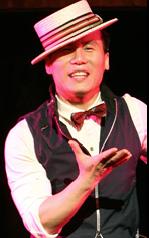
BD Wong in Herringbone
|
Herringbone/Book by Tom Cone,
Herringbone
Did ya ever have one of those years. . .
One of those head-shakin' years. . .?
Fifty-Two weeks
Of giggles and shrieks
And up-again, down-again choices. . .
—from "One of Those Years" in which Herringbone sets his story's beginning in 1929 "the year panic became respectable."
One of those head-shakin' years. . .?
Fifty-Two weeks
Of giggles and shrieks
And up-again, down-again choices. . .
—from "One of Those Years" in which Herringbone sets his story's beginning in 1929 "the year panic became respectable."
Wong is a Wow! He sings, he dances, he deftly handles the role of narrator and ten complicated characters. He is a gushing fountain of personality and charm. He's also a real trouper, returning to his energy guzzling role after an on-stage injury on opening night. If only Herringbone, the one-man musical at Williamstown Theater's Center Stage were fully worthy of Wong's charm and talent. Tom Cone's rather bizarre vaudeville flavored Dybbuk story that has 8-year-old George possessed by Lou, a noxious 37-year-old tap dancing midget known as frog is certainly unique. It's even about something, if you catch the drift of the thematic undercurrent about the often devastating exploitation of child stars.
Wong's multiple cast of characters includes not just innocent George, split personality George and the monstrous Lou but, hold your breath: Lou's respectably retired partner Nathan "Chicken" Mosely, George's money and fame hungry father, his ineffectual mother, his grandmother, the salesclerk who sells him a herringbone suit (the creation of master costumer William Ivey Long), a lawyer, a hotel receptionist and the narrator, Herringbone. But despite Wong's virtuoso performance, a self-aware creepiness wins out over credibility. And while director Roger Rees has helmed the show to be visually appealing (bravo to Neil Patel's smart herringbone patterned floor covering!), he has allowed it to meander along for about thirty minutes longer than called for.
Actually Wong isn't totally alone on stage, but gets terrific musical support from big bass player Benjamin Cambell, percussionist Richard Huntley and, most especially pianist Dan Lipton, who as a non-speaking character named Thumbs Dubois acts as Herringbone's straight man. What about the music they play and Wong sings? Here again, Wong who as evident here and in his past performances in You're a Good Man, Charlie Brown and Pacific Overtures (Charlie Brown review & Pacific Overturesreview) deserves nothing but the best is only partially well served. Skip Kennon's music is okay but not stick-to-the-ears memorable and Ellen Fitzhugh's lyrics are often but not consistently clever, "One of Those Years" which opens and closes the show being the most outstanding.
My reservations notwithstanding, Herringbone is an unusual show that's not likely to come around again any time soon. (A 1980 production at Playwrights Horizons was followed by a long lull and it's taken Mr. Wong more than ten years to find a producer willing to give him a chance to do it again, after a failed attempt in Philadelphia). If you're a vive la difference theater goer who doesn't want to miss anything way off the beaten path, you'll want to catch this very different little musical before it ends its limited run. To make up for a cancelled performance due to an area-wide power outage, an extra performance has been added for June 24th at 7pm.
It should also be noted that the Center Theater is a spectacularly lovely and atmospheric space. It has dramatic sliding doors that lead into the theater that has sharply raked, perfect sight line seats for about a hundred people. A side gallery for extra seating winds around the rear of the stage conjuring up all sorts of staging possibilities. —Reviewed by Elyse Sommer on June 21st.
|
Herringbone Book by Tom Cone (based on a play by Cone) Music by Skip Kennon Lyrics by Ellen Fitzhugh Directed by Roger Rees Musical direction is by Dan Lipton Cast: BD Wong as Herringbone Dan Lipton asThumbs Dubois (Piano); Benjamin Campbell a Slim (Base Guitar); Richard Huntley as Patty (Drums) St Choreography: Darren Lee Costume design: William Ivey Long Lighting design: Frances Aronson Scenic design: Neil Patel Sound design: by Nick Borisjuk |
|
Musical Numbers
| |
Act One |
Act Two
Three Waltzes: |
Dissonance-World Premiere
|
Quartet playing [is] in some ways a marriage. Marriage can be the most wonderful thing in the world, it can also be a nightmare. You have to be very strong about what you feel and how you present it. . .when that works, each person contributes their own voice, their own way of feeling, their own sound into the musical dialogue—Samuel Rodes, Julliard String Quartet. Being in a quartet is like you're all in a car [and] one musician's learning to drive, another is navigating and the other two are back-seat driving. And you swap roles every 10 minutes.— Andrew Haverow, Brodsky Quartet. |

Daniel Gerrol as James Bradford, founder and first violin of the Bradford String Quartet in in Dissonance
(Photo: Andy Tew) |
Lanigan, a published novelist and writer for BBC radio and TV, has crafted his play like a chamber music piece, with a string quartet sized ensemble. To broaden his drama's thematic reach, he's added an unlikely fifth player from outside the classical music world —Jonny, a rock superstar (Patch Darragh). He's pulled off quite a feat: a talky play that nevertheless crackles with dramatic tension. The talk is smart, incisive and filled with humor as well as poignance. And it never feels talky, thanks in no small measure to the richly individualized performances from the talented ensemble and the unflaggingly attention-holding but never rushed pace of Amanda Charlton's direction.
In an interview conducted for the WTF program by dramaturge Becky Perlman, Mr. Lanigan, a classical music enthusiast but not himself a musician, states that he sees the process of rehearsal and performance as intrinsically theatrical. And so it is, at least in this story built around the Bradley Quartet's rehearsal for a ten year anniversary concert at Carnegie Hall. Despite their enormous success in James and Paul's (Rufus Collins) native Great Britain and all over the world, the famous concert hall and all four musicians' long absence from New York sets up an instantaneous sense that the upcoming anniversary may not be all that celebratory an occasion. No wonder the play is called Dissonance.
With the rehearsals for the big anniversary concert as his plot building blocks, Lanigan has smartly enlisted Mozart to help him establish the group's temperamental differences with a musical bang. With the four players barely visible on a blacked out stage we hear the opening notes of Mozart's "C-Major Quartet, K.465" a.k.a. as the " Dissonance Concerto" because in the opening passage, the cello (the instrument played by Alicia Witt), sounds out of place against the other three instruments' voices. When the music stops and the lights go on, we see the counterpoint to the dissonant sound of the music played out in an argument about the tempo between James and Hal, (Thomas Sadoski), the group's second violin as the cellist and viola players remain silent.
Naturally, the argument between the fifty-ish James and his thirty-ish former student goes deeper than differences about tempo. James rules the group with an arrogant sense of entitlement. Unlike Hal and Beth (also a former student) he had a solo career of great promise before founding the quartet. He rides roughshod over Hal's attempts to impose his ideas on the group and accepts Paul's subservient loyalty of Paul as his due.He sums up this hierarchy as he sees it as follows: "There's a way this is supposed to work—me first violin, he second violin, she Jane, you Cheetah."
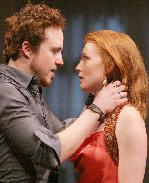
Patch Darragh and Alicia Witt in Dissonance
(Photo: Andy Tew) |
The play cleverly ricochets back and forth between the two story lines in twenty-four pacey scenes, most in Andrew Layton's handsome panelled rehearsal studio, some at the side of the stage, and the student-teacher scenes between Beth and Jonny on a handsome forward and backward sliding second set. As in the opening, there's a blackout whenever the actors are making music. Unlike John Doyle who's made a name for himself by casting musicals with actor/musicians, Ms. Charlton allows her actors to focus on their acting so we never see the characters actually playing their instruments, but only picking them up or putting them down. While I don't usually like a lot of blackouts, this works very well and the actors handle the instruments so convincingly that their not playing takes nothing away from their finely nuanced performances.
Daniel Gerroll is ideally cast as the charismatic, overbearing but troubled prodigy who's become a petty tyrant and whose own emotional scars cause him to be as cruelly truthful to his colleagues as a teacher was to him many years earlier. Thomas Sadoski gives new meaning to the frustration the term second fiddle is sure to have provoked in many second violinists. The ethereally beautiful Alicia Witt, an actress new to me, is a wonderful casting choice as the cellist who is a source of added dissonance between the two violinists. It's her character who changes and grows the most by play's end. Rufus Collins plays the always conciliatory viola player with touching understatement. Just watch his head nod with delight as Jonny, during a visit to one of the rehearsals, sings one of his song for them. Which brings us to Patch Darragh's terrifically likeable and persuasive Jonny.
It would have been so easy for the subplot about the multi-millionaire rock star as a counterpoint to the close-minded James (himself an almost rock star of classical music like Joshua Bell) to be beyond belief. But Darragh, besides being attractive and sexy, manages to make us see what Beth does —a genuine young man with genuine instincts for music's life-affirming, joyful function. As he tells Beth after they've discovered they each had their own musical epiphanies at age seven, "There's one thing about the way music can make you feel. . . The Ramones, The Beatles, Bach, it doesn't matter—if it's good, it makes you feel love." Darragh is also the only actor on stage who really makes music. In fact, he actually wrote the music for his song, "When the Music Stops" and collaborated with the playwright on the lyrics.
With Williamstown so close to the Tanglewood Music Festival, it's too bad that the two festivals couldn't have gotten together and planned some synergetic events —a talk back with some quartet musicians, an excerpt from the play at Ozawa Hall, with some of the background pieces played by Tanglewood Music Fellows. As I'm writing this review, I note that I've marked one of my favorite Tanglewood events on my calendar for July 2nd: The Annual String Quartet Marathon comprising three two-hour concerts (at 10 am and 1 and 4pm). I usually go to just one of these, but the Bradley String Quartet has definitely whetted my appetite so that I may just take in all three.
Finally, while this short run at the Nikos Stage is likely to l seed other productions of this entertaining play, Mr. Lanigan is not the first playwright using a string quartet as the subject for a drama. Michael Hollinger's Opus is set for a run New York's Primary Stages late this summer. For the review of that play go here.
July 2 Postscript: The Tanglewood String Quartet Marathon mentioned above was lovely, and more meaningful than usual because it came so soon after seeing Dissonance. I also followed up on a tip from an audience member at the Nikos and read Vikram Seth's novel An Equal Music (I gobbled it up in one sitting over the weekend) which is also about a fictional string quartet. It too was twice as enjoyable as a result of having seen Dissonance. Whether you see the play (and I hope you will) or not, a highly recommended "great read" and available in paperback: An Equal Music- Paperback edition. —Reviewed by Elyse Sommer on June 28th.
|
Dissonance By Damian Lanigan Directed by Amanda Charlton Cast: Rufus Collins (Paul), Patch Darragh (Jonny), Thomas Sadowski (Hal), Daniel Gerroll (James) and Alicia Witt (Beth) Lighting Designer: Marcus Doshi Set Designer: Andrew Layton Sound Designer: Bart Fasbender Costume Designer: Jennifer Caprio Original Song "When the Music Stops", Music by Patch Darragh, lyrics by Patch Darragh & Damian Lanigan Transition music performed by Julianne Carney (violin) and Gil Selinger (cello) Running Time: 2 hours plus one 15-minute intermission |
|
I'm an anarchist, not a Bolshevik.—Earl Williams, whose trial and scheduled date with the hangman has Chicago's newshounds gathered in the press room of the Criminal Courts building.
|
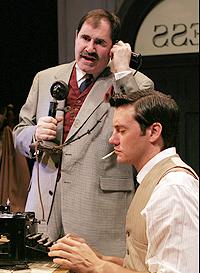
Richard Kind and Jason Butler Harner in The Front Page.
(Photo: Andy Tew) |
The days when newsboys hit the streets, big canvas shoulder bags filled with newspapers, and yelling "Extra! Extra!" are long gone. So are the days when big cities like New York and Chicago had more than half a dozen papers and afternoon editions. But the image of the $70-a-week, hard-drinking, tough-talking, scoop-hungry newsmen famously captured by Ben Hecht and Charles MacArthur in The Front Page lingers. Their play lives not only as a nostalgic depiction of another era but as an ironic reminder that corrupt politicians have not gone the way of Underwood typewriters, feodora hats and spectator shoes.
Hecht and MacArthur's use of profanity and references to prostitutes and pimps did not keep The Front Page from being a hit when it opened on Broadway in 1928. And even without the titillation stirred by complaints of indecency and inappropriateness, the comedy has been regularly revived ever since. It also made it to the silver screen, the most famous version being an adaptation called His Girl Friday in which lead newspaperman Hildy Johnson was transformed into a woman (played by Rosalind Russell). John Guare re-adapted this into a stage play that moved things away from the late twenties' Red Scare to the beginning of World War II. That adaptation was mounted last year at the National Theatre (Review of that production).
In keeping with a season of classic first half of the 21st Century plays, Williamstown Theatre Festival's Front Page sticks to the original. The rapid fire dialogue with its overlapping conversations and politically incorrect racial references are all intact, as is the frantically paced plot with its farcical twists and turns. Unlike some of the posh new theater's somewhat too spare early productions, this one boasts a fabulously detailed and authentic set by Riccardo Henandez, complete with a marquee for Al Jolson's The Jazz Singer atop the proscenium (with Jolson singing between scenes courtesy of sound designer Nick Borisjuk). The cast is smartly outfitted from hats to gleamingly shined shoes by Linda Cho.
As usual at Williamstown, the stage fills up with a generously sized cast of fine actors. Heading the cast are Richard Kind as the Examiner's ruthless editor Walter Burns and Jason Butler Harner as Hildy Johnson, his star scoop chaser. Hildy is as determined to leave the paper for a more settled life with his best girl Peggy Grant (Amanda Leigh Cobb) as Burns is determined to hold on to him. For Harner, most recently seen as the Russian writer Turgenev in Tom Stoppard's epic Coast of Utopia, this is a chance to show off his considerable comic talents. Kind's many comic assignments include The Producers and a terrific revival of Stoppard's Ronscranz & Guildenstern are Dead at WTF's Nikos Stage. As for the support players, who better to portray Peter D. Hartman, the Sheriff who deserves (and gets) his well-deserved comeuppance than Wayne Knight, Jerry Seinfeld's obnoxious neighbor, Newman the mailman?
Knight, like everyone else, is quite good though even if you were blindfolded it would be hard to shake the Seinfeld association. The versatile Robert Stanton is on the mark as the prissy Roy V. Bensinger who hates having anyone sit at the big rolltop desk he has staked out as his own little office but which will end up serving as the equivalent of the typical farce's four doors for hide-and-seek funny business. Sean Patrick Reilly is perfect as a gangster-ish character named "Diamond" Louie, and so is Kathy McCafferty as the kind-hearted hooker Mollie Malloy. Even the cameo roles are cast with admirable care. In fact, there are a few scenes when Tom Bloom's occasionally appearing, none too honest Mayor and John Cariani's Irving Pincus, a messenger from the Governor's office are the most entertaining players on stage.
Despite his major role, Richard Kind appears apart from the frantic doings in the press room for much of the play. He's seen only via a giant framed photograph of his paper's building that quite ingeniously reveals itself to be a scrim through which we watch Burns doing his bossy best to keep Hildy for picking up his suitcase and going off to marry his girl. While designer Hernandez deserves an extra round of applause for that clever bit of stagecraft, it underscores the fact that it isn't really until Burns plants himself center stage that this production bursts into full-blown laugh-aloud mode. The enjoyable presentation and excellent performances notwithstanding, once you get over admiring the set and the costumes and listen to some of the insults and phone calls flying around the room, the rest of the act is a too dragged out setup for the events surrounding the hanging of a hapless revolutionary convicted of killing a black policeman in a city with a large, influential black voter base.
Nice as authenticity is, this Front Page is too long by at least fifteen minutes. By the end of that overly drawn out first act I felt director Ron Daniels would have done well to not only tighten it but to also conflate the old-fashioned format into two parts with one intermission. —something which has become common practice. Fortunately, before I could ponder about whether Mr. Daniels might not have done better using John Guare's adaptation of the His Girl Friday version of the original, the pace did pick up and by the time Burns and Johnson land another triumphant scoop and the crooked Mayor and Sheriff are bested (at least for a while) a good time was had by all.
—Reviewed by Elyse Sommer on July 5th.
|
The Front Page By Ben Hecht and Charles MacArthur Director: Ron Daniels Cast: Cast: Jason Butler Harner (Hildy Johnson), Wayne Knight (Sheriff Hartman), Richard Kind (Walter Burns), Brian Hutchingson (Wilson), Joe Plummer (Endicott), Ted Koch (Murphy), Matthew Rauch (McCue), Rod McLachlan (Schwartz), Michael Braun (Kruger), Robert Stanton (Bensinger), Greg Hildreth (Woodenshoes Eichorn), Sean Patrick Reilly (Diamond Louis), Anne O'Sullivan (Jennie), Kathy McCafferty (Mollie Malloy), Wayne Knight (Sheriff Hartman), Amanda Leigh Cobb (Peggy Grant), Kay Walbye (Mrs. Grant), Tom Bloom (The Mayor), John Cariani (Mr. Pincus), Bill Cwikowski (Earl Williams), Cary Donaldson (Carl - A Deputy), Jose Grau (Tony "G") Patrick Lynch (Frank - A Deputy) Sound Designer: Nick Borisjuk Set Designer: Riccardo Hernandez Costume Designer: Linda Cho Lighting Designer: Charles Foster Reviewed by Elyse Sommer on July 5th |
Villa America-World Premiere
| Gertrude Stein said we were the Lost Generation. But the lost generation were those we left behind. We weren't lost, we were looking— F. Scott Fitzgerald, in an exchange with Sara Murphy whom he professed to love as much as his troubled wife Zelda. When he tells her he recognized her in Picasso's "Reclining Nude With Pearl Necklace" by the trademark pearls she wore even at the beach, she explains that "The sun was good for them. It cheered them up." |
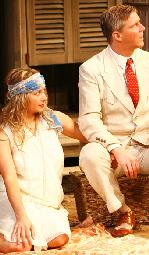
Jennifer Mudge and Karl Kenzler as Sara and Gerald Murphy
(Photo: Carol Rosegg)
|
The years that I've been reporting on the Berkshire cultural scene have seen a number of enjoyable and smart collaborations between neighboring organizations. Shakespeare & Company has been particularly successful in making the most of such opportunities. Their adaptation of Edith Wharton's Summer set in the Berkshires to run simultaneously with a Berkshire Opera Company production comes to mind, as do their invitations for the Tanglewood Music Festival to compose and perform in various Shakespeare works.
While Williamstown Theatre Festival missed an opportunity for some sort of joint enterprise with real string quartet members at Tanglewood during the run of the excellent Dissonance, it has gone all out to create synergy with a neighbor for its second world premiere at the Nikos Stage. Villa America was specifically commissioned to tie in with the Williams College Museum July through November exhibit Making It New: The Art and Style of Sara and Gerald Murphy.
Given his past dramas about real people whose lives have already been tapped for biographical scrutiny by biographers and film makers (Charles Darwin in Darwin at Malibu and Richard Feynman in Clever Dick), it's understandable why up and coming British playwright Crispin Whittell was selected for this task. Gerald and Sara Murphy's names don't have the instantly recognizable name status of the artists who, like them, migrated to France in the 1920s, but they showed up as figures in their books and paintings. And, as the Williams College Museum of Art's splendid exhibit makes clear, their life style and charisma was enormously influential and Gerald Murphy was himself an artist of considerable merit even if not on a par with friends like Picasso and Legér.
After arriving in Williamstown in time to take in the museum show before curtain time, I took my seat at the Nikos with high anticipation. But while Mr. Whittell can't be accused of not doing his homework, Villa America too often seems like just that —a diligently undertaken homework assignment, that he's stuffed with fact-based events and conversations while allowing himself the dramatist's right to go off on his own imagined track. This would be fine if the biographical information really shed as much light on what made the Murphys as dynamic as the museum exhibit does and if Whittell's imaginary detours and his direction animated this drama for its full two hours rather than sporadically.
The biographical material is accurate enough but it's too fragmentary. Without a preliminary viewing of Making It New, many of the references will either not mean much or feel as if pulled from the abundant literature about the three main representatives of the Murphy circle — Ernest Hemingway (as played by Matthew Bomer, the most interesting and attractive character on stage), F. Scott Fitzgerald (Nate Corddry) and Pablo Picasso (David Deblinger who gets nary a chance to flex his well-toned acting muscles in what amounts to a cameo and somewhat caricaturish role). Hemingway's recollection of how his wife lost a year's worth of manuscripts on a train in one of his biographies was something I remembered quite vividly from one of his biographies. On the other hand, had I not seen the images and videos of the jazz ballet Gerald Murphy (Karl Kenzler) collaborated on with a still unknown Cole Porter, his mention about going to Venice to work on this would have been a somewhat confusing throwaway line.
Hemingway and Fitzgerald are not only the play's most interesting, but its most rounded characters. A scene in which Hemingway urges Fitzgerald to leave his wife before she destroys his writing career is also the most dramatic. However, it's more than a bit of a stretch to believe that the one unfamous character, Henrietta (Charlotte Booker), the governess of the never seen Murphy children, would sweep on stage and bring the violence that errupts to a quick end. According to a program interview with dramaturg Drew Lichtenberg, Whittell dreamt up this character because "I liked the idea of having a French governess." Booker does her utmost to make this invented character (while also doubling as two other characters) deliver the comic relief no doubt intended. However, Henrietta, like everything about Villa America, seems too manufactured to be memorable.
And what about the dynamic hosts of the Villa America, Sara and Gerald Murphy? Ah, and there's the biggest problem with this made-to-order play. The photos and videos, the diaries and ribbon-tied love letters, the legends accompanying the museum show convey at least some of this couple's role as central figures in the 1920s cultural landscape. On the Nikos stage, both Karl Kenzler and Jennifer Mudge look the part of elegant expatriates but they come across as ciphers. Mudge whose high quality acting chops I've seen on display in two Off-Broadway productions (Pavilion and Dutchman ) doesn't have much to do here except look beautiful, sport the bathing suit with famous strand of pearls and at one point shed it to bring one of Picasso's nudes to life.
The play's structure is a backward arc as in Harold Pinter's Betrayal. In short we start in 1968 in the Murphy's home in East Hampton, shortly before Sara Murphy's death, after after most of the other characters' death. It then works backward to the 1920s s in Antibes, and finally to the couple's hopeful, everything's before us beginning in 1915, again in East Hampton. There's nothing especially wrong with this setup, but neither is it so effective that the same story couldn't have been told without the flashback technique.
Mimi Lien's single unit set efficiently serves both beach scenes. It's beautifully lit by Thom Weaver. Nick Borisjuk provides suitable incidental music and Emily Pepper's costumes are lovely, especially the peach kimono worn by Jennifer Mudge.
As of July 22nd, this play and the Murphy exhibit's synergy comes to an end. The play will vacate the Nikos to make way for another. The exhibit will remain in Williamstown through November and then travel on to Yale University and the Dallas Museum of Art. WTF has smartly preserved this premiere staging of Villa America in a printed edition under the apt imprint of First Look Press. As the text on the inside cover explains it is intended " to give theaters and authors the power to create a limited-edition script right away." And so, while you can purchase the handsome little book "it may well evolve in new directions before it is officially published some day." If Villa America is to stand on its own, without the clarifying museum show available to WTF audiences, it will indeed require a second and even a third look.
— Reviewed by Elyse Sommer on July 12th.
|
Villa America Written and directed by Crispin Whittell. Cast: Matthew Bomer (Ernest Hemingway), Charlotte Booker (Mrs. Murphy/Henriette/Adeline Wiborg ), Nate Corddry (F. Scott Fitzgerald), David Deblinger (Pablo Picasso), Karl Kenzler (Gerald Murphy) and Jennifer Mudge (Honoria Murphy Donnelly/Sara Murphy ). Sets: Mimi Lien Lighting Designer: Thom Weaver Sound Designer: Nick Borisjuk Costume Designer: Emily Pepper Running Time: 2 hours, includes one 15-minute intermission Reviewed by Elyse Sommer on July 12th. |
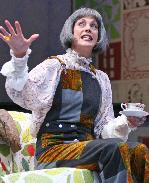
Wendie Malick as Madame Arcati in Blithe Spirit
(Photo: Joan Marcus)
|
|
Would you like a cocktail?—Charles Condomine. If it's a dry Martini, yes—it it's a concoction, no. Experience has taught me to be wary of concoctions.—Madame Arcati, the eccentric medium whose seance, instead of providing Charles with material for his next book, turns him into an "astral bigamist " by summoning up the glamorous ghost of his first wife Elvira. |
While Coward's sophisticated brand of comedy has become a theatrical artifact, enough theater goers appreciate his cocktail laced repartee and the era it evokes for the revivals to keep coming. However, for souffles like Blithe Spirit to rise, it's been the directors who give Coward's light touch free reign, without attempting to give it a new, more up-to-date sensibility, who have been most successful. The last Blithe Spirit I saw at a small off-off-Broadway theater succeeded because its director heeded Madame Arcati's caution about concoctions intended to improve on simple dry martini. Not so Maria Mileaf the director of Williamstown Theatre Festival's eleventh Coward production but first Blithe Spirit.
Mileaf's revisionist version takes its cue from Irving Berlin's "Always" the song Madame Arcati uses to jump-start her seance for Ruth and Charles Condomine (Jessica Hecht and Bernard White) and their friends Doctor and Mrs. Bradman (Adriane Lenox and Michael Boatman). While "Always" (as recorded by Billie Holiday) has not been scuttled, Mileaf has peppered her production with between scene music by 1970s musicians like Neil Diamond, the Zombies and Bill Preston.
The musical time frame also applies to Neil Patel's scenery. The spacious living room, with its French doors leading to the garden and another double door for entrances and exits to the rest of the Condomines' stately country home specified in Coward's stage directions, is still there. But the furnishings go with the music, as do Katherine Roth's costumes. The only prop to fit a more traditional setting is a giant mirror which is the device for introducing the glamorous ghost of Coward's delicious blithe spirit, Charles' wife Elvira (Kate Jennings Grant). That mirror is an ingenious bit of stagecraft and the costumes, especially Madame Arcati's purple jumpsuit and stunning patchwork coat, are great fun.
Unfortunately, if Ms. Mileaf's intent was to show that Coward's second world war setting was no more dated than more recent cultural eras like the 70s with their bell bottom pants, mini skirts and sideburns, it simply doesn't work. In fact, it diminishes rather than enhances Coward's aura. Since Coward was a talented and prolific composer, using some of his music between scenes would have made for a more suitable and less gimmicky update.
The good news about this production is that it does follow the plot and retains Coward's always sprightly dialogue. Some of the patter between Charles and Ruth is strongly reminiscent of an even greater Coward favorite, Private Lives. No wonder that Ruth urges Charles to get out his notebook when he remarks "It's discouraging to think how many people are shocked by honesty and how few by deceit." While Coward intended Blithe Spirit to be a "very gay, superficial" comedy, and did to a fine turn, despite all the cocktail lubricated chatter, the emotional quandaries about sex and commitment belong to real people not just stick figure characters. But here's the bad news about this good news. Any successful revival of this play relies on the actors' delivery of the text, the delicacy with which the more outrageous farcical humor is handled, and the pace and timing of the action. While this is a cast of fine actors whose work I've admired elsewhere, their delivery here is often more shouted than spoken, the accents tend to be wildly uneven and the humor is way too overcooked.
Jessica Hecht comes off best in the accent and line delivery department. She's also very funny in a scene where having to cope with the ghost of her predecessor drives her to drinking from two glasses and also smoking a cigarette (the only instance when the use of cigarettes as a prop is really necessary). Bernard White's and Kate Jennings Grant who were both guided by Ms. Maleaf to give superb performances (Grant as the title character in last year's Berkshire Theatre Festival revival of The Heidi Chronicles and White in Sakharam Binder) are not quite as satisfying here. Grant is lovely to look at but somehow falls short of being ethereal. If Daniel Gerroll, seen just a few weeks ago in Dissonance, would have been a much more ideal choice for this role (which he has actually played elsewhere). Most miscast and with a hard to understand accent is Adrienne Lennox's Mrs. Bradman.
Wendie Malick is so hilarious as Madame Arcati that you're inclined to forgive the excesses of her performance; ditto for Jenn Harris as Edith, the eager to please but terminally inept maid. Too bad, that they've been directed to follow the motto that more is always better than less. As this production would have benefited from Madame Arcati's preference for a straightforward drink rather than a concoction, it would also have been funnier heeding Ruth's directive to Edith: " As you are not in the Navy, it is unnecessary to do everything at the double."
—Reviewed by Elyse Sommer on July 21st.
|
Blithe Spirit
By Noel Coward Directed by Maria Mileaf Michael Boatman (Dr. Bradman), Kate Jennings Grant (Elvira), Jenn Harris (Edith), Jessica Hecht (Ruth), Adriane Lenox (Mrs. Bradman), Wendie Malick (Madame Arcati), and Bernard White (Charles). Sets: Neil Patel Costumes: Katharine Roth Lighting: Nicole Pearce Sound: Fitz Patton Reviewed by Elyse Sommer on July 21st. |
Party Come Here—world premiere musical comedy
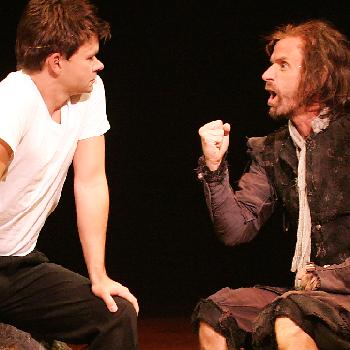
Hunter Foster & Malcollm Gets
(Photo: Andy Tew )
|
|
When we want big celebration, Somehow it always appear Don't have to look far. . . Wherever we are. . . The party come here —Volere, singing lyric from the title song. |
All three of Daniel Goldfarb's plays that I've seen had some interesting things to say about dealing with being a Jewish American. Adam Baum and the Jew Movie used Hollywood during the Goldwyn era to address Goldfarb's s concerns about Jews who hide their Jewishness in the interest of assimilation and Gentiles who harbor anti-semitic feelings even when they proclaim their liberalism. Sarah, Sarah explored a single American woman's adoption of an Asian infant within the context of her Jewish family history. Modern Orthodox, which also dealt with the assimilated Jew issue, has enjoyed numerous regional productions.
The theatrical Gods (a.k.a. producers) smiled on Goldfarb by giving his work handsome productions featuring casts and directors that no one would write off as chopped liver. Not one to let a play that hadn't yet found a producer gather dust, Goldfarb collaborated with composer/lyricist David Kirschenbaum to musicalize one of his unproduced efforts. The Goldfarb mazel (good luck, for non-yiddish speakers) held and his debut musical venture, Party Come Here, was showcased at last year's New York Music Festival (as usual with a topnotch cast and director), and then tabbed for this season at Williamstown.
Goldfarb's focus on Jewish-flavored plays has carried over to Party Come Here. One of its two rather awkwardly connected story lines involves a one-man chorus in the person of a Marrano or hidden Jew named Orlando. But while Malcom Gets does his utmost to make Orlando a lovable and wise Teyve style character, the only connection between this musical and Fiddler on the Roof is an easily recognized riff borrowed from that show towards the end of the first act.
Since this is the first musical at the handsome and comfortable new Nikos Stage, I wish I could say it's a stand up and cheer first. But, despite a cast featuring performers with topnotch Broadway musical credentials, Christopher Ashley's as usual peppy direction, and Daniel Knechtges' well-honed choreographic skills, Party Come Here hits the ground stumbling over awkward plot improbabilities.
The libretto ricochets back and forth between New York and Rio. New York is where nondescript, twenty-seven-year-old Jack (Hunter Foster) wins the hand of Kate, a gorgeous blonde (Kate Reinders). Rio became home to Jack's dad, Wood (Adam Heller) after he abandoned Jack's overachieving mom Liberty (Kaitlin Hopkins). That Kate would wait until she stood under the ceremonial Chuppah to call a halt to the wedding and agree to reconsider her last minute bailout only if Jack takes her to Rio to meet his father and his young Brazilian bride Volere (Chauntee Schuler) is improbability number one.
Because Foster is such an endearing nerd, Reinders so perfectly mimics the terminally adorableness of Kristin Chenoweth (she actually did a stint in the good witch role in Wicked that Chenoweth created) and Heller is such a pro, you're likely to overlook their derivatively written characters. But when ditzy Kate becomes enamored of the self-indulgent Wood and Jack is lured to life in the cave where Orlando has been hiding out since the inquisition, improbability rises to skyscraper heights. But that's not all. Mom Liberty also heads for Rio to find her missing son and our 500-year-old man Orlando is persuaded to abandon the caution expressed in "You're a Jew" for a brief but wonderful Rio moment.
All this silliness is cobbled together by Kirshenbaum's bouncy mix of Brazilian, Klezmer and traditional show tunes. The music is better than the book and includes some fun songs like "Life Is a Coconut" in which Wood sums up his philosophy of easy living and Orlando and Jack's "Everybody Hates." While some of the head-miking seems excessive for a theater that's small enough to indulge in that rare pleasure of hearing a singer's natural voice, it doesn't really matter since even the savvier numbers barely enter one ear before departing and are at any rate wasted on this mish-mash of a book.
Director Ashley has a crackerjack team of designers to stage this party with plenty of zip. G. W. Mercier's scenery, includes a striking replica of the famous Christ the Redeemer stone statue that towers over Rio. It shifts to a Statue of Liberty backdrop for the New York scenes. The props to evoke the varied locations even include an airport security screening area. Howell Binkley's lighting and David C. Woolard's costumes add to the colorful ambience.
Given the talent assembled, Party Come Here should live up to its opening song, and have "Miracles Happen" on the Nikos Stage. Instead it's a painless and only occasionally amusing entertainment.
—Reviewed by Elyse Sommer on July 21st
Postscript: Actually, the distinction of first musical at the new Nikos Stage goes to The Opposite of Sex which also had the distinction of working quite well even when its lead temporarily lost her voice. That lead, Kerry Butler, was part of the NYMusic Festival's workshop production of Party Come Here.
|
Party Come Here Book by Daniel Goldfarb Music and Lyrics by David Kirshenbaum Directed by Christopher Ashley Cast: Kaitlin Hopkins (Liberty), Malcolm Gets (Orlando), Kate Reinders (Kate), Hunter Foster (Jack) Chauntee Schuler (Volere), Wood Adam Heller Choreography: Dan Knetchges Musical Direction: Vadim Feichtner Sets: G.W. Mercier Costumes: David Woolard Lighting: Howell Binkley Sound: Jim van Bergen Running Time: 2 hours including one intermission Reviewed by Elyse Sommer on July 26th |
|
Musical Numbers
| |
Act One
|
Act Two
|
The Corn Is Green
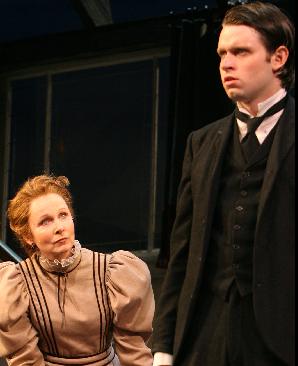
Kate Burton & Morgan Ritchie in The Corn Is Green
(Photo: Joan Marcus)
|
|
How can you be interested in a machine that you put a penny in and if nothing comes out you give it a good shake? 'Evans, write me an essay; Evans, get up and bow; Evans, what is a subjunctive?' My name is Morgan Evans, and all my friends call me Morgan. . .and do you know what they call me in the Village? The schoolmistress's little dog!. . . — Morgan, letting loose on his pent-up resentment at what he considers Miss Moffat's impersonal, uncaring relationship with him. Of course, Miss Moffat is anything but uncaring, as is evident from the moment when she first reads his essay describing his feelings about being in the dark mines: ". . .and when I walk—in the dark. . .I can touch with my hands. . .where the corn is green." |
Kate Burton's fine, no-nonsense Miss Moffat is particularly interesting since protege Morgan Evans is played by her own Morgan, son Morgan Ritchie. Unlike a failed 1970 attempt to turn the play into a musical for Bette Davis and Vivian Matalon's equally wrong-headed 1983 attempt to give the play a more socially relevant twist with color blind casting, director Nicholas Martin has lovingly and authentically staged The Corn is Green without trying to update Emlyn Williams' script and stage directions (oh, why have playwrights given up those wonderful details about how they envision the presentation of their plays?—for example Williams' description of John Goronwy Jones as "a shabby Welshman, bespectacled, gloomy and intense, a volcano harmless even in full eruption.") Set designer, James Noone has obviously taken a cue from the shadowy picture of the original Broadway production's set included in the published playscript and transformed the spacious main stage into a book filled turn of the century living room. In the same way, sound designer Drew Levy opens each of the three acts with the evocative Welsh singing mentioned in Williams' stage notes.
Sure it's a period piece. And sure, it takes a strong lead to put over the somewhat simplistic "let's open a school" version of the popular "let's put on a play" plot and to avoid tarnishing the virtues of Miss Moffat's commitment by the implication that a worldly career outweighs all considerations of familial connection. Happily Burton, herself of Welsh descent (her father, the late Richard Burton, was the son of a Welsh miner and, like Williams, had a mentor who influenced his path in life), gives a feisty, funny and vital performance.
As for the world Williams describes. . . unfortunately, it's all too relevant. Schools today, even in this rich country, are too often under funded and short-change children. We also have plenty of big corporations, like the mine owners in The Corn Is Green, enriching themselves at the expense of their workers' welfare.
While this is Morgan Ritchie's first major role, he's got a leading man's dark good looks and has mastered the demands of a thick Welsh accent gradually becoming anglicized. His performance grows with his character, especially when drink causes him to let his pent-up rage at what he views as his teacher's uncaring treatment of him explode into a passionate attack and temporary misstep with the play's seductive bad girl Bessie Watty (Ginnifer Goodwin). Goodwin, whom many will recognize from the HBO drama, Big Love, proves that she can be as beguiling in a less sympathetic role.
Kathy Mc Cafferty and Rod McLachlan are also excellent as Miss Ronberry and John Goronwy Jones, the frustrated spinster and religious bachelor who are enlisted to become teachers in the home-based school. Much of the comedy is provided by Becky Ann Baker, as Bessie's light-fingered Cockney mom, now Miss Moffat's devoted maid and member of the Salvation Army; also by her husband Dylan Baker who comes close to stealing the show as the Squire persuaded to help with the plan for Morgan to obtain an Oxford scholarship. The second act scene in which Moffat turns flirtatious to con the Squire into believing that he might join other great writers' patrons by endorsing Morgan's cause is one of the play's comic highlights. But even the tiniest parts, like Tom Bloom's Old Tom, deserve a hand.
I'd like to conclude with a round of applause for some other unseen but noteworthy contributors to the success of this enjoyable revival: Jeff Mashie for his handsome period costumes, wig wizard Paul Huntley and dialect coach, Stephen Gabis.
—Reviewed by Elyse Sommer August 2nd
|
The Corn is Green By Emlyn Williams. Directed by Nicholas Martin Cast: Kate Burton (Miss Moffat), Morgan Ritchie (Morgan Evans) Dylan Baker (the Squire) Ginnifer Goodwin (Bessie Watty), Rod McLachlan ( John Goronwy Jones), Becky Ann Baker (Mrs. Watty), ), Kathy McCafferty (Miss Ronberry), Blake Segal (Idwall Morris), Amanda Leigh Cobb (Sarah Pugh),Tom Bloom (Old Tom) Lighting Designer: Frances Aronson Set Designer: James Noone Sound Designer: Drew Levy Costume Designer: Jeff Mahshie Reviewed by Elyse Sommer |
Crimes of the Heart
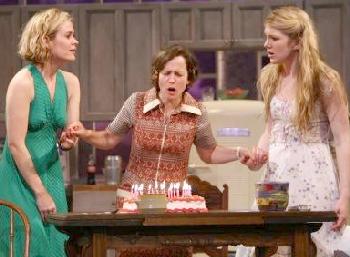
Sarah Paulson, Jennifer Dundas & Lily Rabe in Crimes of the Heart
(Photo: Joan Marcus)
|
|
. . . we've just got to learn how to get through these real bad days here—Meg
|
Seeing this production less than a week after I became re-enamored with the Gibbs sisters of Paul Osborn's Mornings at Seven at Berkshire Theatre Festival, adds a wonderful touch of serendipidous synergy for anyone seeing both plays. As Osborn's sisters and their era (1922) came to vivid life thanks to performances that were as poignant as they were hilariously funny, so Henley's much younger sisters living in post-Hurricane Camille Mississippi (1974) are also dealing with suddenly exacerbated tensions. Like the Gibbs sisters, the Magraths are sublimely served by Jennifer Dundas as Lenny, the oldest; Sarah Paulson as Meg, the middle sister; and Lily Rabe as Babe Botrelle, the youngest and only married one.
The three subsidiary characters are also well done. Kali Rocha, who has never turned in a bad performance, has never been better than as obnoxious busy-body cousin Chick Boyle. If Lenny didn't end up chasing her out the door with a broom, you would be tempted to do it in her place. Chandler Williams nails Southern boy lawyer Barnette Lloyd who comes to rescue Babe from having to pay for the irrational crime of the heart that she's commited. Patch Darragh, who excelled as a rock superstar in Dissonance (this season's first play at the Nikos), is perhaps a bit too understated as Meg's former boyfriend Doc Porter whose leg and dreams of a medical career were crushed when Meg persuaded him to ride out the hurricane instead of seeking shelter. On the other hand, a bit of understatement is not a bad thing in a play where everyone's eccentricities are heightened to an almost surreal level. In fact, one of the keys to the success of Turner's direction is that she doesn't let the eccentricities get so out of hand that we end up laughing a lot, but missing the deeper nuances beneath the black comedy.
Everything Turner does is true to the playwright's construct of a plot built on a foundation of wackiness that almost defies belief, but makes sure that each character is at once funny and one of life's walking wounded. And so the family troubles are trotted out almost nonstop: From the less volcanic troubles, like Lenny's sense of feeling forgotten on her thirtieth birthday and convinced a "shrunken ovary" and the years spent taking care of Old Granddaddy have killed all her prospects for marriage, to Babe's recipe for the lemonade she made herself to soothe her dry throat after she shot her abusive husband in the stomach. The thick as molasses Southern-speak in which all the actors are well-versed and consistent is spiced with dialogue that makes you burst out laughing even though there are no one-liners per se.
Each sister has her own idiosyncracies and there are the usual little sibling betrayals and resentments, but different as they are in looks and mannerism, all bear the scar of their father's desertion and their mother's suicide. Jennifer Dundas does a terrific balancing act as Lenny. She's straitlaced and solid but full of insecurities that make putting an ad in a newpaper match-making page an act of enormous courage. She's also has her moments of being touched by the Magrath lunatic tendencies. Lily Rabe, who's becoming one of the most valuable young actors on stage, is quite wonderful as the childlike Babe who not only shot her husband because she "didn't like his looks" but had an affair with a black teenager because she was lonely and he was "so good."
Sarah Paulson's Meg is tougher than the older sister, and less ethereal than the younger, but she's no less damaged. She's had plenty of men but feels incapable of love and the singing career Great Granddaddy wanted her to have is in a state that would make it best if he remained comatose.
Like the play, Kris Stone's set is grounded in both naturalism and abstraction, with the sprawling kitchen following the stage directions — except that while the furnishings are realistically three-dimensional, the walls and cabinets are more abstract than in a conventional kitchen sink drama. Charles Foster's lusciously lit sky outside the windows and Christal Weatherly's personality defining costumes, all contribute to the satisfactions of this production. Sound designer Drew Levy effectively paves the way for the first family travail (Lenny's lonely birthday celebration) and the finale (another birthday celebration) with his incidental music.
As I left the theater I found myself wondering what the Magraths would be like if Beth Henley did a sequel about them today when they would be closer in age to the Gibbs sisters in Morning at Seven. But since this isn't likely to happen it's nice to have another look at both these close-knit sets of sisters. For even more synergy between local organizations, Barrington Stage's last Main Stage production would be The Three Sisters (said to be Henley's inspiration for Crimes) instead of Uncle Vanya.
For more plot details, check out our review of the last New York revival at Second Stage here.
—Reviewed by Elyse Sommer.
|
Crimes of the Heart By Beth Henley Directed by Kathleen Turner Cast: Jennifer Dundas (Lenny Magrath), Kali Rocha (Chick Boyle). Patch Darragh (Doc Porter). Sarah Paulson (Meg Magrath). Lily Rabe (Babe Botrelle). Chandler Williams (Barnette Lloyd ) Lighting Designer: Charles Foster Set Designer: Kris Stone Sound Designer: Drew Levy Costume Designer: Christal Weatherly Running Time: 2 hours and 15 minutes, one intermission Reviewed by Elyse Sommer on August 9th |
The Autumn Garden
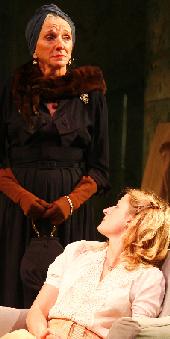
Elizabeth Franz & Mamie Gummer
(Photo: Carol Rosegg)
|
|
I've never liked liars-least of all those who lie to themselves—Crossman Most of us lie to ourselves, darling, most of us—Constance |
I've seen and liked Hellman's plays; some live on stage, some in film adaptations. I enjoyed her memoirs, even the ones that turned out not to be quite the first-hand experiences she claimed as well as Joan Mellen's dual biography, Hellman and Hammett. I and my colleagues at Curtainup have reviewed various productions of Hellman's two most autobiographical plays: The Little Foxes based on her mother's family; and Toys in the Attic, based on her father and his adoring sisters. However, I've read but never seen The Autumn Garden so I looked forward to the Williamstown Theatre Festival's revival, especially given the impressive cast assembled.
The cast doesn't disappoint. However, the play, which was never a big hit (just 101 performances when it premiered on Broadway in 1951, no movie and only occasional revivals), isn't one of those neglected gems that has aged all that well —let alone improved and gained fresh relevancy. There's some wonderful dialogue here, especially when the most senior character, Mrs. Mary Ellis (Elizabeth Franz), is on stage. Franz is terrific as the sharp-tongued, sour matriarch for whom old age makes loneliness less appealing than it once was ("Happiest year of my life was when my husband died. Every month was springtime and every day I seemed to be tipsy as if my blood had turned a lovely vine rosé.")
The trouble is that in an apparent attempt to counter critics who called her plays too melodramatic, the playwright opted to by-pass dramatic fire for little flareups to explore divorce, infidelity, loneliness, disappointment. Oh, and let's not forget homosexuality which with Hellman's emphasis on subtlety is kept firmly in the realm of "the love that dare not speak its name." For today's audiences this is almost laughable except when seen in the context of the still very "proper" post World War II era.
While there are hints of Tennessee Williams in the unspoken tension between Carrie Ellis (Elizabeth Mace) and her son Frederic (Eric Murdoch) the overall setup is the equivalent of a Chekhovian country estate—an erstwhile private mansion on the Gulf of Mexico about 100 miles from New Orleans. Its nouveau poor owner, Constance Tuckerman (Allison Janney), has of necessity turned it into a guesthouse. Except for a climactic drunk scene, the atmosphere at the Tuckerman house is overhung with a Chekhovian air of ennui, disappointment and unhappy relationships all thrown into high relief by the arrival of Constance's long ago beau Nicholas Denery (John, Benjamin Hickey) and his attractive but tense wife Nina ((Jessica Hecht). Their bags are packed to overflowing with their own marital problems and Nick brings Hellman's own lover, Dashiell Hammett to mind.
The really major problem is that Hellman hasn't created characters you can care about deeply. Even young Sophie Tuckerman (Mamie Gummer-if you think she's a Meryl Streep look alike, that's because she is Streep's daughter) doesn't qualify as a much needed heroine. While she allows some of the older people at the guest house to manipulate her to suit their own needs, she ends up doing a tricky bit of manipulating herself.
The women are more interesting and fully realized than the men, but good as all the actors are in portraying their characters, there's so much they can do to shake the cobwebs out of the play that they've been given. And while Janney is the big box office name of this production because of her long tenure on West Wing, Hecht, Plunkett, Gummer and Franz actually have the showier female roles, with Franz several times coming close to stealing the show.
Director David Jones could have made this a less slow to bloom garden by eliminating one of the two intermissions and speeding up the numerous exits and entrances. Jones must also be faulted for some terrible blocking decisions. It's incumbent on a director to spend some rehearsal time in locations other than the fifth to tenth rows center. To give an example: Had Jones (or some of his interns) bothered to spend time in one of the side loges, in the furthest from the aisle side section seats and the first two to four rows, he would have seen to it that the waist high table at which one first sees Elizabeth Franz had been coffee table height as it frequently blocked the actors. If Mozart took the trouble to check out his operas from various locations, why couldn't Mr. Jones?
LINKS
The Little Foxes -London
The Little Foxes-Lincoln Center
Toys in the Attic-Off-Broadway
Toys In the Attic-Berkshire Theatre Festival
Toys In the Attic-Los Angeles
Hellman & Hammond-Book Review
|
The Autumn Garden By Lillian Hellman. Directed by David Jones Cast (In order of speaking): Maryann Plunkett (Rose Griggs), Elizabeth Franz (Mary Ellis), Brian Kerwin (General Benjamin Griggs), Rufus Collins (Edward [Ned] Crossman), Eric Murdoch (Frederick Ellis, Cynthia Mace (Carrie Ellis), Mamie Gummer (Sophie Tuckerman), Rama C. Marshall (Leon), Allison Janney (Constance Tuckerman), John Benjamin Hickey (Nicholas [Nick] Denery), Brooke Parks (Hilda), Jessica Hecht (Nina Denery). Sets: Thomas Lynch Costumes: Ilona Somogyi Lights: David Weiner Sound: John Gromada Reviewed by Elyse Sommer on August 16th |
The Physicists
|
What is thought cannot be unthought.—Jonathan William Mobius
|
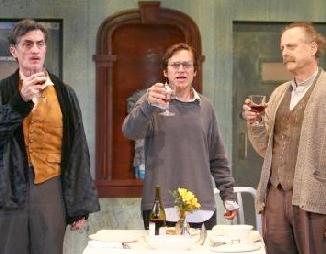
l to r: Roger Rees, Rob Campbell & Mark Blum
(Photo: Joan Marcus)
|
But wait. The play these characters are in is by Friedrich Dûrrenmatt's 's (January 5, 1921 – December 14, 1990) the Swiss playwright who explored Brecht's Epic theater, also known as the theater of alienation, with macabre satires in the genre of crime novels as well as dramas. And so nothing is clear or obvious. The men playing Einstein and Newton may be two maniacs named Herbert George Butler and Ernest Henry Ernesti or different people entirely. This is in keeping with Dûrrenmatt's often quoted comment that "a story is not finished, until it has taken the worst turn." And so the murder of one of the sanatoreum's nurses by the Einstein character (shortly after the Newton character strangled another nurse) is just the first turn in the twisty farce about murder, mayhem and science that's as melancholy and disturbing as it is hilarious.
Dûrrenmatt wrote The Physicists in 1961 in order to make audiences reflect on the advances in science and nuclear technology during and after World War II, and the threat they posed in a world unprepared to deal with the accompanying responsibility. That time frame might make the play too dated and worth seeing strictly for its comedy. However, it takes no great stretch of the imagination to apply the play's grimmer aspects to the world we live in. Therefore, this revival based on James Kirkup's excellent translation is a case of a play that's a lot less dated than a lot of other revivals.
Besides the script's intrinsic intrinsic assets of funny and biting dialogue, this production benefits from Kevin O'Rourke's smooth, pacey direction. It also proves to be an excellent vehicle for the first collaboration between the Williamstown Festival and Williams College's Summer Theatr Lab at the spacious CenterStage. The idea is to bring together future thespians and professionals. Thus the ten-member cast has the minor ones played by Lab students. The key roles are played by WTF pros, terrific actors all and with the kind of clear and carrying dialogue delivery so many aspiring actors fail to master.
The actors playing the triumvirate of physicists includes: The festival's artistic director Roger Rees as Newton — or Herbert George Butler, who may be a madman or someone more surprising . . . Mark Blum as a delightfully nutty Einstein or, like Rees's Newton, a madman or possible other persona. . . Rob Campbell capturing the melancholy without losing the humor of Mobius. It's the Mobius character, the playwright's version of the 19th-century mathematician August Ferdinand Mobius, whose presence drives the second act's plot surprises (my lips are sealed-- go see the play yourself).
Brenda Wehle is elegant and marvelously maniacal as the doctor in charge of this luxury retreat (or prison?) that's supported by funds from rich patients and her illustrious relatives ("My family is so ancient, it's something of a miracle, in medicine, that I should be relatively normal. I mean, mentally.") John Feltch is wonderfully clueless as Police Inspector Richard Fox. Director O'Rourke sees to it that the novice thespians — Meggie Nidever, Kaveh Landsverk, Morgan Phillips-Spotts, Lydia Barnett-Mulligan— hold their own.
Set designer Alexander Dodge makes effective use of the Center Stage's multi-level performance space. Deborah A. Brother's costumes, Colin K. Bill's lights and David Sanderson's sound design complete this entertaining and thought provoking production.
—Reviewed by Elyse Sommer
|
The Physicists By Friedrich Dürrenmatt, translated by James Kirkup Directed by Kevin O'Rourke Cast: ), Mark Blum (Ernest Henry Ernesti-Einstein), Rob Campbell (Jonathan William Mobius), John Feltch (Police Inspector Richard Fox),Roger Rees (Herbert George Butler-Newton), Brenda Wehle (Fraulein Doctor Mathilde von Zahnd), Cary Donaldson (Deacon Rose/Louise Sievers),Meggie Nidever (Police Doctor/Mrs. Rose), Kaveh Landsverk (Blocker/Attendant), Morgan Phillips-Spotts (Sister Boll), Lydia Barnett-Mulligan (Monica Stettler), Lighting Designer Colin Bills Set Designer Alexander Dodge Sound Designer David Sanderson Costume Designer Deborah Brothers Musical contributors: Allison Kline (piano), Eric Schulman (violin) Running Time: 1 hour 45 minutes including one intermission |
Try onlineseats.com for great seats to
Wicked
Jersey Boys
The Little Mermaid
Lion King
Shrek The Musical

Easy-on-the budget super gift for yourself and your musical loving friends. Tons of gorgeous pictures.

Leonard Maltin's 2007 Movie Guide

At This Theater
Leonard Maltin's 2005 Movie Guide

 >
>

Wicked
Jersey Boys
The Little Mermaid
Lion King
Shrek The Musical

Easy-on-the budget super gift for yourself and your musical loving friends. Tons of gorgeous pictures.

Leonard Maltin's 2007 Movie Guide

At This Theater
Leonard Maltin's 2005 Movie Guide

 >
>

